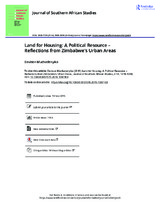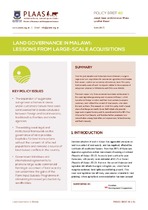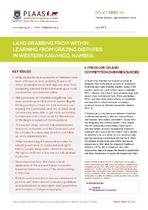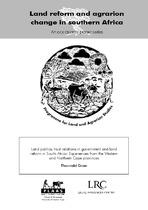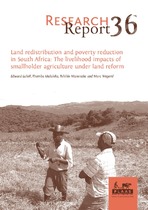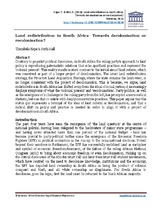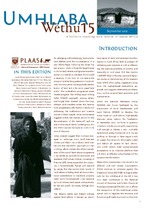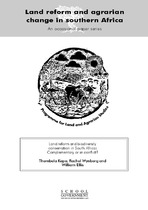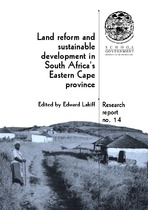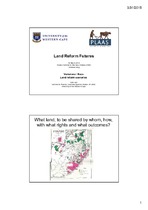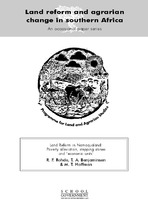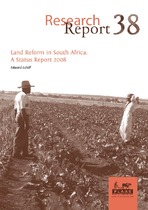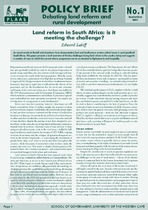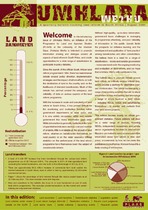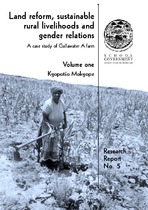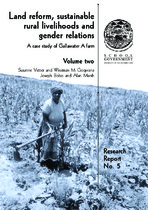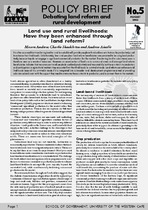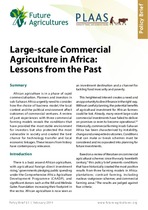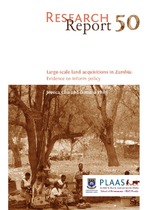Browsing Faculty of Economic and Management Sciences by Title
Now showing items 546-565 of 1094
-
Land for housing: A political resource – reflections from Zimbabwe’s urban areas
(Routledge, 2015)When the Zimbabwean government launched the Fast Track Land Reform Programme (FTLRP) in 1999, an international outcry followed, with Zimbabwe described as an international pariah state. Zimbabwe entered a prolonged ... -
Land governance in Malawi: Lessons from large-scale acquisitions
(Institute for Poverty, Land and Agrarian Studies, University of the Western Cape, 2015)Over the past decade rural Malawians have witnessed a surge in large-scale land acquisitions for commercial agriculture that threaten their access, control and ownership of customary land. This policy brief presents ... -
Land grabbing from within: Learning from grazing disputes in Western Kavango, Namibia.
(Institute for Poverty, Land and Agrarian Studies, University of the Western Cape, 2015)In recent years Namibia has received a number of proposals from multinational agricultural corporations to develop large-scale irrigation projects, mainly in the country’s water-rich, north-eastern regions (Odendaal 2011). ... -
Land politics, trust relations in government and land reform in South Africa: Experiences from the Western and Northern Cape provinces
(Institute for Poverty Land and Agrarian Studies (PLAAS), 2006)The land question, as it is posed academically in South Africa, is at the cutting edge of the development debate.1 Should land held by poor peasants, often under some kind of communal tenure, be re-organised as private ... -
Land redistribution and poverty reduction in South Africa: The livelihood impacts of smallholder agriculture under land reform
(Institute for Poverty, Land and Agrarian Studies, University of the Western Cape, 2007)Since its inception in 1994, South Africa’s land reform programme has aimed to achieve multiple objectives, including redressing the historical racial imbalance in landholding, alleviating poverty and developing the ... -
Land redistribution in South Africa: Towards decolonisation or recolonisation?
(Taylor & Francis, 2018)Contrary to populist political discourses, in South Africa the ruling party’s approach to land policy is reproducing paternalistic relations that echo apartheid practices and represent the ’colonial present’. This reality ... -
Land redistribution: Part of a wider agrarian reform strategy
(PLAAS, 2012-09)An emerging and increasingly more prominent debate amid the considerations of a new White Paper, following the Green Paper process, which will set the legal framework for land reform and agrarian transformation, is whether ... -
Land reform and biodiversity conservation in South Africa: Complementary or in conflict?
(Institute for Poverty Land and Agrarian Studies (PLAAS), 2003)This paper aims to improve understanding of the conflicts that have arisen between land reform and conservation, and to encourage better comprehension between the land and conservation sectors. It does this by analysing ... -
Land reform and sustainable livelihoods in South Africa's Eastern Cape province
(Institute for Poverty, Land and Agrarian Studies, University of the Western Cape, 2002)The Eastern Cape is one of the nine provinces of South Africa, located in the south-east of the country along the Indian Ocean seaboard. The area was a site of prolonged struggle between native peoples, principally Xh ... -
Land reform futures
(2015)Overarching story • Away from pro-poor neo-liberalism towards the convergence of state resources, private capital and traditional authority • Elite capture of shrinking state resources – dangerous combination in context ... -
Land reform in Namaqualand: Poverty alleviation, stepping stones and economic units
(Institute for Poverty Land and Agrarian Studies (PLAAS), 2001)This paper examines the consequences of land reform for communal livestock farmers in Namaqualand. It investigates the likely outcomes of recent commonage acquisitions and tenure reform in the former ëColoured Reservesí ... -
Land reform in South Africa: A status report 2008
(Institute for Poverty, Land and Agrarian Studies, University of the Western Cape, 2008)After 14 years of democracy in South Africa, there is agreement across the political and social spectrum that the state’s programme of land reform is in severe difficulties. Almost since its inception, the programme ... -
Land Reform in South Africa: Is it meeting the challenge?
(Institute for Poverty, Land and Agrarian Studies, University of the Western Cape, 2001)As recent events at Brendell and elsewhere have demonstarted, land and landlessness remain critical issues in post-apartheid South Africa. This paper presents a brief overview of the key challenges facing land reform in ... -
Land reform policies under review
(PLAAS, 2004-08)Welcome to the introductory issue of Umhlaba Wethu, an initiative of the Programme for Land and Agrarian Studies (PLAAS) at the University of the Western Cape. Umhlaba Wethu is intended to promote information sharing and ... -
Land reform, sustainable rural livelihoods and gender relations: A case study of Gallawater A farm: Volume 1
(Institute for Poverty, Land and Agrarian Studies, University of the Western Cape, 2000)The research project aimed to investigate the impact of land reform processes on sustainable rural livelihoods and on gender relations in South Africa by examining a case study in the Eastern Cape province. -
Land reform, sustainable rural livelihoods and gender relations: A case study of Gallawater A farm: Volume 2
(Institute for Poverty, Land and Agrarian Studies, University of the Western Cape, 2000)There is an ongoing debate about the sustainability of South African communal rangelands as old views on overgrazing and degradation are being widely challenged. The degradation issue has recently received renewed ... -
Land use and rural livelihoods: Have they been enhanced through land reform?
(Institute for Poverty, Land and Agrarian Studies, University of the Western Cape, 2003)It is often assumed that transferring land to rural households will provide people with valuable assets that can be productively used to enhance their livelihoods. Unfortunately, few rural people or land reform beneficiaries ... -
Large-scale commercial agriculture in Africa: Lessons from the past
(Institute for Poverty, Land and Agrarian Studies, University of the Western Cape, 2014)African agriculture is in a phase of rapid commercialisation. Planners and investors in sub-Saharan Africa urgently need to consider how the choice of business model, the local context and the political environment affect ... -
Large-scale commercial agriculture in Africa: Lessons from the past
(Institute for Poverty Land and Agrarian Studies (PLAAS), 2014)African agriculture is in a phase of rapid commercialisation. Planners and investors in sub-Saharan Africa urgently need to consider how the choice of business model, the local context and the political environment affect ... -
Large-scale land acquisitions in Zambia: Evidence to inform policy
(Institute for Poverty, Land and Agrarian Studies, University of the Western Cape, 2015)Land in Zambia plays a vital role in sustaining livelihoods, ensuring food security and reducing poverty. If people are not able to access land (including communal interests, such as lands for grazing or access to water ...

